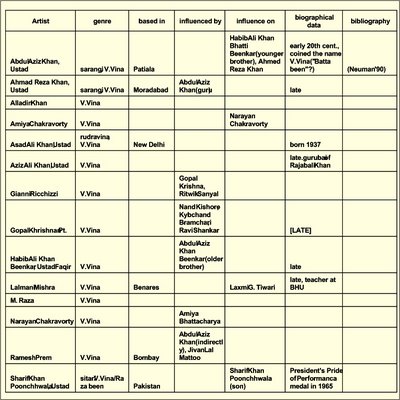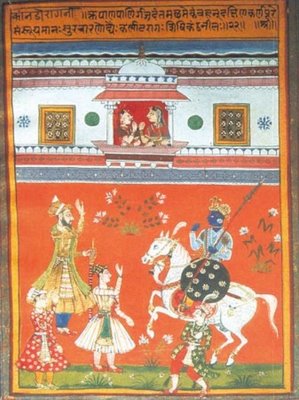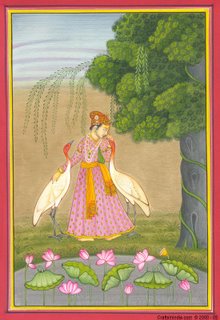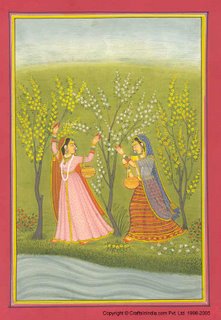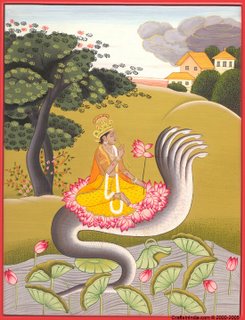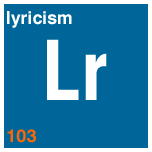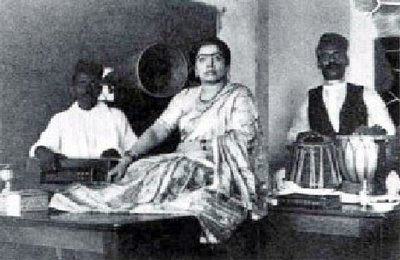
Of historical interest . . .
My name is Gauhar JanAh, but a bit of GR [google research] reveals the author of the article about Gauhar Jan to be one Suresh Chandvankar. It earlier appeared
here (in an online publication called The South Asian, Oct. 2003) and also
here (in Musical Traditions).
Another article, by Pran Nevile (Sunday Tribune, 2002) is here:
The importance of being Gauhar Jan. The two articles overlap somewhat, but each includes many details not mentioned by the other.
A fascinating, more scholarly article about the
ganewalis ["singing ladies"] was written by Saleem Kidwai: "The singing ladies find a voice"
http://www.india-seminar.com/2004/540/540%20saleem%20kidwai.htm
It includes a number of observations about Gauhar Jan. This little anecdote may serve to suggest the high regard she commanded from the musical cognoscenti:
<< She sang Tagore’s songs, with his permission, but set to her own tunes, a privilege not allowed to others till the recent ending of the copyright covering the Tagore compositions. >>
==========
Here's her
discography (or the beginning of one; a note indicates her full discography of known recordings runs to some 160 items), -- with three MP3 "excerpts" (1 min 5 sec each), including:
Bhairavi thumriBhupaliKhamaj jogia==========
More music of Gauhar Jan online!
This remarkable page -- on Patrick Moutal's blog -- features some 272 items of Indian classical music (as MP3 files), including the following:
1. Gauhar JAN,
Desh (02:40) 2,4MB
2. Gauhar JAN,
Gandhari (02:21) 420KB (24kbps)
3. Gauhar JAN,
Gara thumri (02:26) 575KB
4. Gauhar JAN,
Jogiya (Jo Piya Aaye Mose...) (02:39) 0,459MB (24kbps)*
5. Gauhar JAN,
Pahari Jhinjhoti (Manwa Lubhao...) (03:29) 0,615MB (24kbps)*
6. Gauhar JAN,
Sindh Kafi (Naino Se Naina Mila) (03:03) 0,540MB (24kbps)*
7. Gauhar JAN,
Bhairavi (Rasili Matwaliyon...) (03:16) 0,576MB (24kbps)*
8. Gauhar JAN,
Piloo (Savariyan Man Bayo...) (02:38) 0,465MB (24kbps)
Those are (moreover) evidently the full recordings (ranging from 2min 21sec to 3min 16sec), rather than 1-min excerpts.
= = = = = = = =
Also, a short recording of the legendary Allauddin Khan (sarod) playing
Zila Kafi.
I was just yesterday watching his California grandson -- Alam Khan -- on YouTube; or, I mean, on
Mehfil Tube. Allauddin Khan emerged from the 19th century; Alam Khan is moving into the 21st.
= = = = = = = =
Relatedly (vis-a-vis Gauhar Jan) and from the same source (I mean, the French blog linked-to at top of this item), see also:
Indian Gramophone RecordsAlso of note:
Raagabase and the
Raaga FinderAlso of note:
Musical Articles Archive (from South Asian Women's Forum)
Our features on the ragas of Hindustani music are written by Rajan P. Parrikar. They contain his insightful analysis and commentary, fortified by around 2000 carefully prepared audio clips that illustrate and illuminate the nuances of raga structure. A large number of these adduced recordings are rare and hitherto unpublished. Rajan, as many of you know, has a penchant to understand not only the music of the masters, but their hearts and minds too.
= = = = = = = =
But every concert should end with Bhairavi.
So let me complete this little series with a 9-min
Bhairavi by the late Lalmani Misra (vichitra vina).
Patrick Moutal's page (source of these various recordings) includes several other selections (some longer) by this notable artist, -- some of them (including this one)
from an old radio broadcast.
= = = = = = = =
Speaking of vichitra vina (and radio broadcasts), this morning I belatedly learned that Pandit Shiv Dayal Batish (originally from Lahore, where he was an All India Radio artist) and living in Santa Cruz, California for many decades) passed away in July of this year. He was one of the very few accomplished vichitra vina players this world has seen.
The instrument dates from the early 20th century, so far as I'm aware. S.D. Batish's son Ashwin (with whom I chatted on phone this morning) mentioned that his father had studied vichitra vina from a student of the originator of the instrument (whose name, alas, I failed to jot down). One little pop claim to fame of S.D. Batish's was his playing vichitra vina in the Beatles' film HELP. But as a singer-musician, composer, musicologist, and all-around scholar, his somewhat hidden legacy is likely
to continue sending late waves into the world. Ashwin anyway is minded to promulgate writings and recordings of his father in years to come . . .
Born in 1914,
S.D. Batish lived into 90s.
I have happy recollections of meeting him in Santa Cruz about 20 years ago.
= = = = = = = =
Ashwin Batish's website includes a notable Indian classical music teachers list ("
The Guru Shishya Database").
Alaka Nandy, exponent of Dagarbani Dhrupad and Damar (and having also a background in Rabindra Sangeet from VisvaBharati/Santaniketan), associated with the Ustad Nasir Moinuddin Dagar
Dhrupad Sangeet Ashram in Calcutta, gives instruction on pakhawaj. But possibly it's a girls-only ashram?
= = = = = = = =
Music India Online has a lot of audio files.
For instance:
Rashid Khan's
Mian ki Todi (brief alap / khayal)
Budhaditya Mukherjee's
Mian ki Todi (sitar). He was born in 1956, like me.
= = = = = = = =
Also: some info on several
annual classical music festivals in India.
